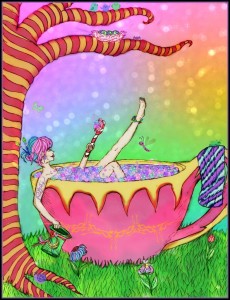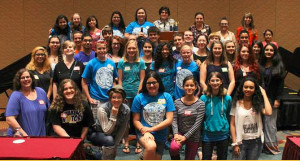Two years ago, Jordan Hamilton was looking for an artistic outlet.
She’d been taking classes at Florida Virtual School’s Escambia County franchise for two years, and after some searching, she found her way to Virge, the virtual school’s student-run literary magazine. She said that at the time, she thought it might offer a forum for her artwork and digital photography, and a way to connect with fellow students. Before long, though, she began submitting her writing, too, and became one of its most prolific contributors. Now in her senior year of high school, she’s among the de facto leaders of a group of students — including some from other states and countries — who assemble the biannual digital publication each semester.

“It’s all coordinated online,” Hamilton said, though “there are opportunities where we can all meet in person.”
Clubs are part of the experience at most schools. They’re where a lot of learning goes on, and they give students places to tap their creativity in ways that aren’t always available during a normal school day.
As it grew to become the largest public virtual school in the country, Florida Virtual School started trying to replicate those experiences for thousands of students online. Its clubs are open to all students who take FLVS classes, including those enrolled in its district franchises and FLVS Global, which caters to students outside Florida.
Each issue of Virge features student artwork, photography and creative writing, organized around a theme. To solicit submissions, plan each issue, and lay out pages, Hamilton works with students in different parts of the state — and in places like California, Kentucky and Malaysia.
Distance has kept her from meeting her collaborators face-to-face, though others have gathered in Central Florida for FLVS’s annual club days. It also means she and her fellow students have to coordinate online conferences across multiple time zones. In between virtual meetings, they share ideas and edits in online wikis.
The credits on the latest issue show the breadth of Hamilton’s contributions, from editing and graphics to a host of submissions.
“If we had an editor-in-chief, it would be her this year,” said Cindy Knoblauch, Virge‘s faculty sponsor, who also helped launch some FLVS clubs.
FLVS began developing its clubs more than 15 years ago. Latin club came first, followed by a science club and the school’s online newspaper. As an English teacher, Knoblauch became the faculty adviser to the newspaper club, and she said she was soon fielding emails from students who wanted to start clubs of their own.
As extracurricular activities became more popular among virtual students, Knoblauch eventually became a full-time student activities coordinator.
The virtual school now offers 27 clubs, and spokeswoman Tania Clow said they drew a combined 3,876 participants last school year.

“It was just led by students and what kind of things they wanted to do,” Knoblauch said.
For students like Hamilton, the literary magazine offers more than an artistic outlet.
It’s also pushed her to learn new skills. Editing images in Photoshop soon gave way to laying out pages in InDesign and experiments with other software. That, in turn, helped Hamilton land a digital media internship with a religious ministry.
“To me, that’s what it’s all about,” Knoblauch said. “There’s a huge amount of growth going on.”



[…] redefinED – Virtual School Clubs Take Art, Extracurricular Activities Online […]